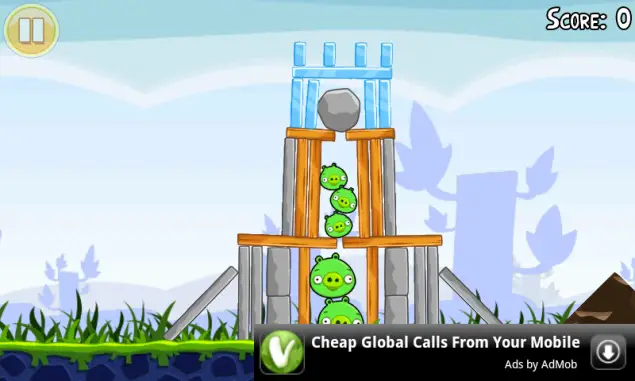Google’s New Ad Policy Could Signal The End For Airpush and Other Annoying Android Ads
There’s always been a sort of love/hate relationship with Android and their exorbitant use of ads inside their apps. On a good day, they’re unobtrusive and give you the chance to experience apps you would normally wouldn’t because you’re too cheap to spend a buck on a theme (I’ve been guilty of this myself). On a bad day, they push ads to your notification bar, hound you about a free iPood you’ve magically won, and install shortcuts onto your homescreen that imitate a separate app.
If you thought Google needed to do something about this it turns out they’re on top of things. Aside from implementing a new feature in Android 4.1 Jelly Bean that allows users to “silence” app notifications (a simple long press on the notification will take care of that), Google recently updated their content policy for ads found inside apps and it looks like they’re cracking the whip on devs using sketchy ad services to pay for their apps. Check out the “Ads Context” description found in their Google Play content policy page:
Ads Context
It must be clear to the user which app each ad is associated with or implemented in. Ads must not make changes to the functioning of the user’s device outside the ad by doing things such as installing shortcuts, bookmarks or icons or changing default settings without the user’s knowledge and consent. If an ad makes such changes it must be clear to the user which app has made the change and the user must be able to reverse the change easily, by either adjusting the settings on the device, advertising preferences in the app, or uninstalling the app altogether.
Ads must not simulate or impersonate system notifications or warnings.
I would just like to point out that last line, “must not impersonate system notifications or warnings.” Sound a bit like those Airpush ads to you? Can’t be sure but developers found in violation of Google’s Play Developer Program Policies can have their app removed from the Play Store and frequent violations can result in their developer’s account being terminated.
The main problem I’ve always had with ads is that I feel like it “cheapens” the Android experience, making users feel like they have some 3rd rate mobile OS on their device. I think Google imposing stricter guidelines on ads inside Android will only help to mature the platform and make users feel more secure that they’re in control of their device, not some pushy app agency. Here’s the full email ‘ol Googs has been sending out to developers. [Thanks, Steven!]
Hello Google Play Developer,
We are constantly striving to make Google Play a great community for developers and consumers. This requires us to update our policies when we launch new features, like subscription billing, and also when we see unhealthy behavior, like deceptive app names and spammy notifications. This email is to notify you that we’ve made some changes to our policies which are highlighted below.
- We’ve added clearer details to the payment policy, and guidelines on how we will handle cancellations in our new subscription billing feature
- We are restricting the use of names or icons confusingly similar to existing system apps in order to reduce user confusion
- We are providing more detail on the kinds of dangerous products that are not allowed on Google Play. For example, apps that disclose personal information without authorization are not allowed.
- We are giving more examples of practices that violate the spam policy.
Additionally, we are adding a new section that addresses ad behavior in apps. First, we make it clear that ads in your app must follow the same rules as the app itself. Also, it is important to us that ads don’t negatively affect the experience by deceiving consumers or using disruptive behavior such as obstructing access to apps and interfering with other ads.
Please take a look at the Google Play Developer Program Policy at http://play.google.com/about/developer-content-policy.html to see all the changes and make sure your app complies with our updated policies.
Any new apps or app updates published after this notification will be immediately subject to the latest version of the Program Policy. If you find any existing apps in your catalog that don’t comply, we ask you to fix and republish the application within 30 calendar days of receiving this email. After this period, existing applications discovered to be in violation may be subject to warning or removal from Google Play.
Regards,
Google Play Team
